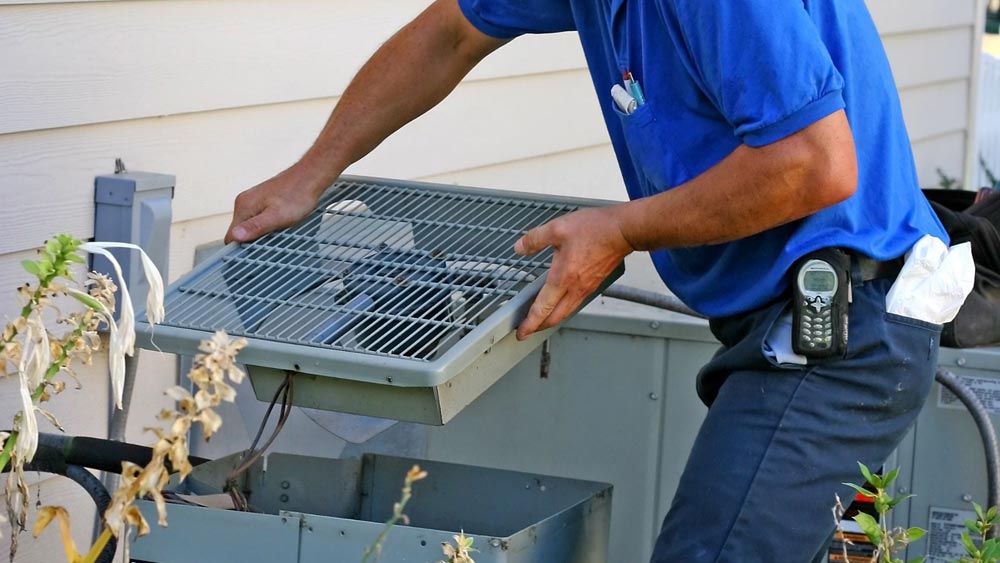Determining the Issue:
Finding the issue is the first step in handling an emergency with air conditioning. This might help you decide if you can handle it alone or if you need to get help from an expert. Here are a few typical indicators that something is wrong with your air conditioner:
- No Cooling Or Insufficient Cooling: There are a few possible causes for this, including a filthy condenser coil, a broken compressor, or a refrigerant leak, if your air conditioner is operating but the air coming out is not cool.
- Unusual Noises: Sounds like grinding, hissing, or banging may be signs of more significant mechanical problems like a broken belt or motor. These sounds frequently indicate an upcoming breakdown.
- Unusual Scents: A musty or burnt smell could be a sign of mould growth in the system or an electrical problem.
- Water Leaks: If there is standing water near the air conditioner, it could indicate a significant problem such as a refrigerant leak or a clogged drain line.
- System Not Working: If the system is not working, there could be a problem with the electrical connections, the thermostat, or a tripped circuit breaker.
Switch the System Off:
It is best to turn off the air conditioning system right away if you think there may be a significant issue. Operating a malfunctioning machine might cause additional harm and more expensive repairs. Turning it off allows you to evaluate the problem and avoids putting further stress on the components.
If there is a wiring or electrical problem, turning off the system also lowers the risk of electrical fires. Confirm that the thermostat is in the “off” position and, if required, turn off the system’s electricity using the circuit breaker.
Examine Your Thermostat:
Verify the temperature settings on your thermostat before assuming you need to make a significant repair. Occasionally, the problem could be as easy as a wrong setting. Verify that the thermostat is in the “cool” setting and that the setting is lower than the ambient temperature. Additionally, see whether the thermostat’s batteries need to be changed.
A faulty thermostat could be sending the wrong signals to your air conditioner, which would cause it to operate improperly. The thermostat may need to be replaced or reset to fix the issue.
Examine The Circuit Breaker:
Look for a tripped circuit breaker if your air conditioner won’t start at all. Occasionally, overloading or power surges can trip the breaker, turning off the unit’s power. Find the electrical panel in your house and check for any breakers that have been turned “off.” Reset the air conditioner by turning the breaker back to the “on” position if the one that controls it tripped. After reset, if the breaker trips again, there may be a more significant electrical problem that needs to be fixed by a qualified HVAC professional.
Clear the Area Around the Outdoor Unit:
A crucial part of heat exchange is performed by the condenser, the outside unit of your air conditioning system. Debris like grass, leaves, and dirt can build up around the unit over time, decreasing its effectiveness and raising the risk of overheating. As a precaution, the unit might occasionally shut down.
Examine the outdoor unit and remove any plants or other debris that might be blocking the airflow. For adequate ventilation, make sure the area around the condenser is at least two feet clear.
Defrost the System:
The air conditioning unit may be frozen if you see ice accumulating on the refrigerant lines or evaporator coils. Usually, low refrigerant levels, limited airflow, or a broken blower motor cause this. Your home won’t be adequately cooled by a frozen air conditioner; it must be defrosted.
Switch off the system and let the ice melt on its own. You should expect to spend a few hours on this, so plan accordingly. To find the root of the problem, once the ice has melted, examine the blower motor, refrigerant levels, and air filter. It’s time to get 24-hour emergency ac repair help if you are unable to diagnose the issue yourself.
When to Give an Expert a Call:
While you can solve some simple problems on your own using basic troubleshooting techniques, there are some issues that call for specialist knowledge owned by the best AC service company. In the following situations, you ought to contact for emergency air conditioning repair:
- Refrigerant Leaks: Because refrigerants can be harmful to the environment and your health, handling refrigerant concerns requires specialized equipment and certification. Refrigerant levels may only be safely repaired or recharged by a professional HVAC expert.
- Electrical Problems: Avoid attempting to remedy an electrical problem on your own if you suspect one, such as damaged wiring or frequent breaker trips. Electrical work should only be done by trained professionals due to its potential for risk.
- Compressor Failure: At the centre of your air conditioning system is the compressor. The entire system will malfunction if it fails. Repairing or replacing a compressor is a complicated undertaking that calls for specialized skills.
- Persistent or Recurring Issues: It’s time to call in an HVAC specialist to diagnose and provide split AC cleaning service if it keeps breaking down despite your attempts at troubleshooting.
Have a Backup Plan:
You can avoid inconvenience or risk by having a backup plan in place in the event of a catastrophic breakdown during harsh weather. While you wait for window ac cleaning service or repair, think about purchasing fans or a portable air conditioner to keep your house cool. To be ready in case of emergency, be sure to have the emergency numbers of nearby HVAC professionals who provide round-the-clock assistance.

